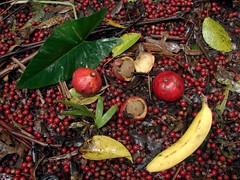| 11098669605 | Agricultural Revolution | Also known as the Neolithic Revolution, this is the transformation of human (and world) existence caused by the deliberate cultivation of particular plants and the deliberate taming and breeding of particular animals. |  | 0 |
| 11098669606 | Austronesian | An Asian-language family whose speakers gradually became the dominant culture of the Philippines, Indonesia, and the Pacific islands, thanks to their mastery of agriculture | 1 | |
| 11098669607 | Banpo | A Chinese archaeological site, where the remains of a significant Neolithic village have been found. |  | 2 |
| 11098669608 | Bantu | An African-language family whose speakers gradually became the dominant culture of eastern and southern Africa, thanks to their agricultural techniques and their iron-working skills |  | 3 |
| 11098669609 | Bantu migration | The spread of Bantu-speaking peoples from their homeland in what is now southern Nigeria or Cameroon to most of Africa, in a process that started ca. 3000 BCE and continued for several millennia. | 4 | |
| 11098669610 | broad spectrum diet | Archaeologists' term for the diet of gathering and hunting societies which included a wide array of plants and animals. |  | 5 |
| 11098669613 | chiefdom | a societal grouping governed by a chief who typically relies on generosity, ritual status, or charisma rather than force to win obedience from the people. |  | 6 |
| 11098669614 | diffusion | the gradual spread of agricultural techniques without extensive population movement. | 7 | |
| 11098669615 | domestication | the taming and changing of nature for the benefit of humankind |  | 8 |
| 11098669616 | end of the last Ice Age | A process of global warming that began around 16,000 years ago and ended about 5,000 years later, with the earth enjoying a climate similar to that of our own time; this changed the conditions for human beings, leading to increased population and helping pave the way for agriculture | 9 | |
| 11098669617 | Fertile Crescent | Region sometimes known as Southwest Asia that includes the modern states of Iraq, Syria, Israel/Palestine, and southern Turkey, the earliest home of agriculture |  | 10 |
| 11098669618 | horticulture | Hoe-based agriculture, typical of early agrarian societies | 11 | |
| 11098669619 | intensification | the process of getting more in return for less; for example, growing more food on a smaller plot of land. | 12 | |
| 11098669620 | Jericho | Site of an important early agricultural settlement of perhaps 2,000 people in present-day Israel |  | 13 |
| 11098669621 | Mesopotamia | The valley of the Tigris and Euphrates rivers in present-day Iraq |  | 14 |
| 11098669622 | native Australians | Often called "Aboriginals" the natives of Australia continued to live by gathering and hunting, despite the transition to agriculture in nearby lands |  | 15 |
| 11098669623 | pastoral society | A human society that relies on domesticated animals rather than plants as the main source of food; pastoral nomads lead their animals to seasonal grazing grounds rather than settling permanently in a single location. |  | 16 |
| 11098669624 | secondary products revolution | A term used to describe the series of technological changes that began ca. 2000 BCE as people began to develop new uses for their domesticated animals, exploiting a revolutionary new source of power |  | 17 |
| 11098669625 | stateless societies | Village-based agricultural societies, usually organized by kinship groups, that functioned without a formal government apparatus | 18 | |
| 11098669626 | teosinte | The wild ancestor of maiz (corn) |  | 19 |
| 11098669627 | Neolithic Revolution | a turning point in the stone age when some humans began farming |  | 20 |
| 11098669628 | Chariot | A wheeled, horse-drawn cart used in battle |  | 21 |
| 11098669629 | Millet | A type of grain first domesticated in China |  | 22 |
| 11098669630 | Sorghum | A tall grass whose seeds are used as grain and to make syrup (native to Australia and Africa) |  | 23 |
| 11098669631 | Cattle | First domesticated in the Sudan and Saharan region (which was covered in grass between 10,000 and 5,000 years ago) |  | 24 |
| 11098669633 | West African Agriculture | Farming in the Western African region around the Niger river which involved yam, oil palm, okra, and the kola nut | 25 | |
| 11098669634 | Llama/alpaca | Descendants of camels, these animals were the only large animals native to the Americas that were domesticated |  | 26 |
| 11098669635 | metallurgy | The science and technology of metals |  | 27 |
| 11098669636 | pastoralism | A type of agricultural activity based on nomadic animal husbandry or the raising of livestock to provide food, clothing, and shelter |  | 28 |
| 11098669637 | Tiv | An African group in central Nigeria that enforced rules and maintained order without going to war. | 29 |
AP World Flashcards
Primary tabs
Need Help?
We hope your visit has been a productive one. If you're having any problems, or would like to give some feedback, we'd love to hear from you.
For general help, questions, and suggestions, try our dedicated support forums.
If you need to contact the Course-Notes.Org web experience team, please use our contact form.
Need Notes?
While we strive to provide the most comprehensive notes for as many high school textbooks as possible, there are certainly going to be some that we miss. Drop us a note and let us know which textbooks you need. Be sure to include which edition of the textbook you are using! If we see enough demand, we'll do whatever we can to get those notes up on the site for you!

